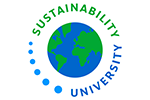Recent research by the Sustainability University Foundation shows that accelerating the circular economy requires professionals in businesses with a distinctive set of competencies. The transition to a circular economy can only be achieved with a different way of working and new behavior. An important conclusion is that the relatively new competency Systems Thinking is not only needed in the sustainability department where the transition towards circular economy is often initiated but also in all other departments in a company. Today the whitepaper with the results of the research was presented to Frits de Groot, Manager Energy and Environmental Affairs at VNO-NCW.
Despite of the constant pressure of the current crisis, companies remain committed to a transition to a more sustainable society. Earlier research by the Sustainability University Foundation (SSU) among approximately 100 sustainability professionals shows that 62% of the companies that were already in a sustainable transition, use the current crisis to continue or even accelerate (22%) in sustainability. They are preparing for a green and social recovery of the economy in which they want to distinguish themselves.
Innovations are needed for circular business models and operations. The investments of companies should focus on technological and social innovations. A different way of working and new behavior is required for the transition to a circular economy. Professionals in different departments will need a certain level of knowledge about circular systems, models, principles and tools and be able to apply these in practice inside and outside the company. In order to do this effectively also new skills and competencies are required.
On December 17th, Frits de Groot of VNO-NCW, received the whitepaper with the results of the research from SSU. The publication, supported by the Goldschmeding Foundation, is a guideline to develop the necessary competencies to accelerate circular business models in companies and organizations.
“We see ambition in many companies to make the switch to a circular business model. However, this sustainable transition is complex and organizations have to redesign many business processes, without much knowledge or experience. The practical tools from this whitepaper can support these companies in their transitions”, said Frits de Groot, Manager Energy and Environmental Affairs at VNO-NCW.
“By identifying new circular competencies, the Sustainability University Foundation has made an important contribution to the transition to a circular economy. This whitepaper offers concrete tools that professionals can use to get started right away. We are very proud being part of this research and the whitepaper”, says Birgitta Kramer of the Goldschmeding Foundation.
The professional of the future combines thinking, acting and connecting
The research focuses on effective CE professionals within companies that are leading the way in the CE. A set of distinctive CE competencies was found that are also (partly) required in the rest of the organization. The professional of the future combines thinking, acting and connecting. For successful circular change, this professional excels in the combination of the cognitive competencies (1) systems thinking and (2) forward thinking, the functional competency (3) management & entrepreneurship and the social competency (4) interpersonal skills. In addition, a CE professional has personal traits such as flexible, investigative, pragmatic, systematic, empathetic, full of initiatives, driven, ambitious and persistent.
“For the transition to CE – as part of green recovery – it is important that professionals have the knowledge, skills and competencies they need to operate circular in all business processes of their companies. For a systemic change to a circular economy, it is important that these competencies and characteristics are recognized and developed”, says Carola Wijdoogen director and co-founder of the Sustainability University Foundation.











